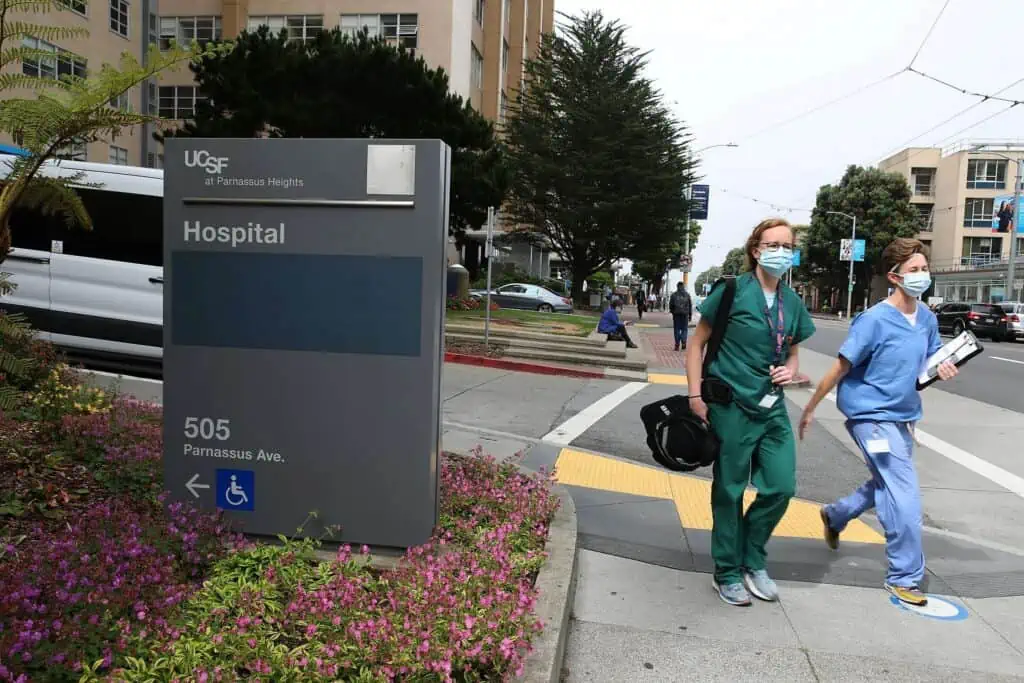The University of California San Francisco is one of the best institutions for graduate-level medical education in the US. While it does not receive many applications like other schools in the UC system, it is very selective.
This article will review the UCSF acceptance rate, admission stats, and requirements for all its professional programs in 2023.
Enough of the formality; let’s get to business.
Is it hard to get into UCSF Medical School?
Yes, getting into the UCSF School of Medicine is tough. The school is selective and employs one of the best holistic review systems.
Being one of the best dental schools in the US, only a few applicants are offered admission to UCSF annually. It is the only medical-oriented public university in the University of California system.
More than 70% of students admitted to UC San Francisco are California residents. This means that admission spots for out-of-state and international students are limited, and only competitive students are selected.
UCSF Medical School acceptance rate
The University of California San Francisco has an overall acceptance rate of 14.8%. This means that out of every 100 applicants, only about 15 students are offered admission.
You can find the acceptance rate for each professional school at UC San Francisco below.
| School | Acceptance Rate |
|---|---|
| Dental School | 6.4% |
| Medical School | 1.8% |
| Nursing School | 64.0% |
| Pharmacy School | 25.4% |
Also Read:
- UC Santa Cruz’s acceptance rate
- UC San Diego’s acceptance rate
- UC Riverside acceptance rate
- UC Merced acceptance rate
- UC Santa Barbara’s acceptance rate
- UC Los Angeles acceptance rate
UCSF Admission Statistics & Average MCAT

Below are the admission statistics for each University of California San Francisco professional school.
UCSF Dental School
Gender
- 60% Female
- 40% Male
Residency
- 63.3% in-state
- 33.3% out-of-state
- 3% international
Dental Admission Test
- DAT Academic Average: 22.8
- DAT Total Science: 17-30
Grade Point Average
- Cumulative average GPA: 3.65
- Cumulative average science GPA: 3.60
Admit Data
- 1,537 applications received
- 99 applicants admitted
- 60 students enrolled
UCSF Medical School
Gender
- 52% women
- 48% men
Average GPA: 3.87
Median MCAT: 516
Residency
- 78% in-state
- 22% out-of-state
Admit Data
- 9,820 applications received
- 547 applicants interviewed
- 161 students enrolled
UCSF Nursing School
Gender
- 85% female
- 14% male
- <1% not specified
Residency
- 76% in-state
- 21% out-of-state
- 3% international
First-generation College Graduate: 37%
Admit Data
- 891 applications received
- 220 applications accepted
- 186 students enrolled
UCSF Pharmacy School
Residency
- 88% in-state
- 9% out-of-state
- 3% international
GPA
- Cumulative GPA: 3.53
- Average science GPA: 3.44
Admit Data
- 500 applications received
- 127 students admitted
UC San Francisco Average GPA 2023
School of Medicine: You need a minimum GPA of 2.94 and a 496 MCAT score to apply. However, applicants need at least a 3.90 GPA to be considered competitive.
School of Dentistry: While applicants need a minimum GPA of 3.0 on a 4.0 scale to apply for the DDS program, an applicant with a 3.70 GPA is considered competitive.
Nursing School: Applicants need a minimum GPA of 3.0 on a 4.0 scale verified by official transcripts to apply. A waiver on the GPA requirement can be requested for the MEPN program.
Pharmacy School: A minimum undergraduate GPA of 2.80 is required to apply. An applicant with a 3.60 GPA is considered competitive.
UCSF Medical School Tuition
Tuition and fees for the 2023-24 academic year are approximately $45,124 for in-state students and $57,379 for out-of-state students.
These figures reflect only the tuition expenses and do not include additional costs like housing, meals, books, supplies, and personal expenses that could easily bump the yearly cost to over $85,000 for in-state and almost $100,000 for out-of-state students.
| Fee Type | Annual |
|---|---|
| Student Services Fee | $1,152.00 |
| Tuition | $11,700.00 |
| Professional Degree Supplemental Tuition* | $25,221.00 |
| Community Centers Facility Fee | $198.00 |
| UC Graduate and Professional Council | $0.00 |
| Graduate and Professional Student Association | $27.00 |
| Associated Students of School of Medicine | $39.00 |
| Student Health Insurance Premium | $6,569.00 |
| Student Health and Counseling Supplemental Fee | $177.00 |
| Disability Insurance – MD Students | $41.00 |
| California Resident Total | $45,124.00 |
| Nonresident Supplemental Tuition | $12,245.00 |
| California Nonresident Total | $57,369.00 |
While the tuition fee is substantial, UCSF offers numerous financial aid programs ranging from loans, and scholarships to work-study opportunities to help alleviate the financial strain for qualifying students.
UCSF Med School Admission Requirements

The University of California San Francisco uses cognitive and non-cognitive factors when reviewing applications. Let’s look at some of them.
1. GPA. Your Grade Point Average (GPA) is the most important admission requirement. Every professional school at UC San Francisco has its GPA requirements.
Although taking some AP classes can help complement your GPA, it must be verified on your college transcript. The class profile should give you the GPA required to be considered a competitive applicant.
2. Academic prerequisites. You must fulfill all academic prerequisites and verify that the University approves your coursework. Premed students must earn a baccalaureate degree before entering UCSF medical school.
All prerequisites must be completed before July 1 of the year of entry into the program. Also, only 105 acceptable quarter units can be transferred from a junior or community college.
3. Admission tests. The medical school requires a Medical College Admission Test (MCAT) for all applicants, the pharmacy school requires a Pharmacy College Admission Test (PCAT), and the dental school requires a Dental Admission Test (DAT).
Your scores on any of these tests reflect your ability and determine if you are getting in or rejected. Test scores older than three years are not accepted for admission by UC San Francisco.
4. Interview. Those applying to UCSF medical school are scheduled for two interviews which last about 40 minutes each, and only about 500 students are interviewed annually. The interviewers are usually faculty members and/or medical students.
For pharmacy school, the interview process is a bit complicated. The interview is by invitation only, and the school interviews about 250 applicants annually.
Declining the invitation gets your application instantly rejected. The interviews are done on the Zoom application, each lasting 45 minutes.
Apart from the main interview, you will also be given a topic to write an essay on within 45 minutes online. You can prepare for the interviews by improving your communication skills, learning from UCSF students, researching your field of study, and honing your writing skills.
5.. Residency. All applicants must include their current state of residence in their application. Legal residents of California pay lower fees and are given more preference.
Out-of-state students can obtain residency by residing in California for at least 12 months before applying to UCSF. International students must submit official documents, transcripts, proof of funds, and other required documentation.
6. Letters of recommendation. Recommendation letters describe you, your contributions, and your potential from the perspective of someone you have worked with. They are even more important than extracurriculars.
You need to submit about 3-5 of them online. Ensure they are written by someone who understands your clinical or research skills. Generally, recommendation letters from family, friends, or associates are not useful.
7. Clinical experience. About 100-500 hours of clinical experience is good enough. Some applicants take gap years to increase their clinical or research experience.
Conclusion
Out of UC San Francisco’s four professional schools, UCSF School of Medicine is the hardest to get into. With a less than 3% acceptance rate, it’s one of the most selective medical schools in the nation.
Apart from outlining the UCSF acceptance rate and admission statistics, we also explained some selection factors for admission purposes. Kindly consider sharing this article with others 🙂
Resource:

Sam is a brilliant young Nigerian biochemistry student and an aspiring entrepreneur. Despite facing many challenges, he has never lost his passion for learning and drive to make a difference in the world. Read more about him here.